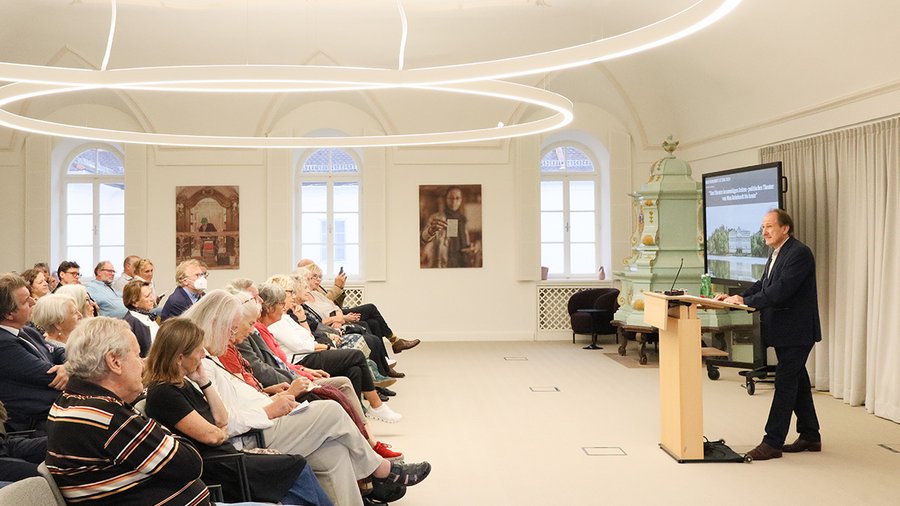In the annual Max Reinhardt Lecture, Markus Kupferblum reflects on theater’s role in democratic societies
As a performing artist, theater personality, and storyteller, Markus Kupferblum believes that narratives and stories have the power to inspire positive change. Theater, for him, has always been inherently intertwined with politics.
On September 9, 2024, Markus Kupferblum, an Austrian theater and opera director, delivered the Max Reinhardt Lecture on "Theater in Troubled Times – Political Theater From Max Reinhardt to the Present Day”. He detailed both the historical and contemporary importance of theater in evoking empathy, providing courage in oppressive contexts, and addressing specific societal issues.
Markus related his insights on political theater to the legacy of Max Reinhardt, whose contributions to theater in the 20th century continue to impact the art world today. In contrast to the political and critical styles that emerged later, Max Reinhardt's approach to theater focused on the centrality of the actor and the immersive quality of performance.
Because of his Jewish religion, Max Reinhardt was forced to flee Austria in 1938 when the Nazis annexed the country. While Max Reinhardt unfortunately never returned to Austria, Markus explained how the political cabaret of Jewish returnees in Vienna after the Second World War provided a stage for grappling with the horrors of the war and the countless individual fates of the victims. During this post-war period, the theater industry in Germany and Austria took a while before presenting political themes alongside the glorification of the past and pure escapism.
Analyzing the historical connection between democracy and theater, Markus noted that both emerged in Athens around 500 BC. “The idea of theater and the idea of democracy were born at the same time and in the same city,” he explained. Throughout history, theater has often had political significance, especially by giving voice to marginalized communities.
The Commedia dell’arte style, an Italian theatrical form that was admired by Max Reinhardt, is an example of theater’s political role in empowering servants, women, marginalized groups, and members of the lowest social class. According to Markus, the Commedia dell'Arte “taught people how to survive".
Looking at the political crises and societal polarization of today, Markus suggested that these contemporary challenges would be the perfect prerequisite for a “new heyday of theater”.
Markus reflected on the importance of theater for encouraging open discourse across differences, saying, “I think that theater is a space opened to different points of views, opinions, discourse, and conflicts. At the same time, it is a kind of example of how to deal with conflicts and how to solve conflicts.”
He elaborated on the role of theater in fostering dialogue across different perspectives. “Theater could manage to show that there is a certain eroticism in dealing with other point of views. And that conflict can be something very fruitful. Then people would maybe stop being afraid of complex situations or ambiguous situations,” Markus added.
During times of crisis, Markus believes that theater can serve as a significant medium with its capacity to connect people in this digital world. Theater has a unique ability to foster shared experiences between audiences instead of isolated virtual interactions.
Markus noted that theater holds the unique power to help people understand others from different backgrounds. He suggested that theater can help people of all ages learn about the power of finding compromises. “The simplest way is to go to schools and to show the kids that that's a way to deal with conflicts or to find out what other solutions we can find in our lives,” he commented.
Concluding his lecture, Markus encouraged theater people to take responsibility for making theater systemically relevant. His reflections remind us that in an era of digital isolation and deep social divides, theater remains a vital, humanizing force - one that invites us to confront, connect, and ultimately, to empathize.
Read the full transcript of Markus Kupferblum's lecture here.
The annual Max Reinhardt Lecture is held annually on September 9, the anniversary of Max Reinhardt's birthday, as a way to honor his artistic legacy and his stewardship of Schloss Leopoldskron.


